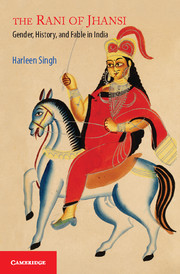Book contents
- Frontmatter
- Dedication
- Contents
- List of Figures
- Acknowledgements
- I Introduction
- II Enslaving Masculinity: Rape Scripts and the Erotics of Power
- III India's Aryan Queen: Colonial Ambivalence and Race in the Mutiny
- IV Coherent Pasts in Hindi Literature and Film
- V Unmaking the Nationalist Archive: Gender and Dalit Historiography
- Afterword
- Bibliography
- Index
IV - Coherent Pasts in Hindi Literature and Film
Published online by Cambridge University Press: 05 July 2014
- Frontmatter
- Dedication
- Contents
- List of Figures
- Acknowledgements
- I Introduction
- II Enslaving Masculinity: Rape Scripts and the Erotics of Power
- III India's Aryan Queen: Colonial Ambivalence and Race in the Mutiny
- IV Coherent Pasts in Hindi Literature and Film
- V Unmaking the Nationalist Archive: Gender and Dalit Historiography
- Afterword
- Bibliography
- Index
Summary
Victorian fiction often strove to curtail Rani Lakshmi Bai's significance by relegating her to domestic and familial scenarios in which she, as the widowed and barren wife, sought revenge by disrupting colonial homes but was then inevitably subdued by the British male. Expectedly, twentieth century Indian representations of the Rani are steadfast in their adherence to a larger political project signifying a unified national impetus towards independence since 1857. These accounts represent the Rani and Indian women by extension, as valued members of the new nation-state, but also as an embodiment of India's tenacious allegiance to tradition. In creating a nation out of an obviously disparate linguistic, cultural, ethnic and social landscape, nationalist history often finds recourse in the certainty of a coherent past and women play a constitutive role in constructing this historical precedent. Indian formations of gender signify the ambivalence of modernity and tradition: while the modernizing processes of the nation must define themselves as respectful of a venerable past, tradition must anticipate the demands and forces of a new age. While colonialist narratives often portrayed her as a volatile individual representing the chaos of 1857, nationalist stories depict the Rani as a stabilising figure – bringing order, purpose and unity to the rebellion and the nation.
- Type
- Chapter
- Information
- The Rani of JhansiGender, History, and Fable in India, pp. 95 - 134Publisher: Cambridge University PressPrint publication year: 2014

